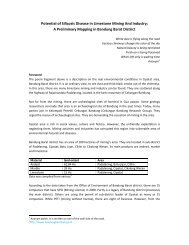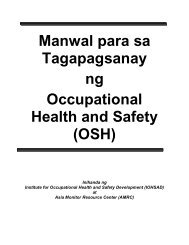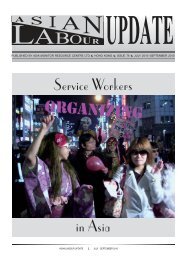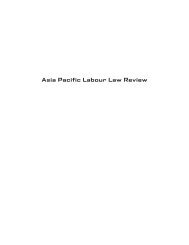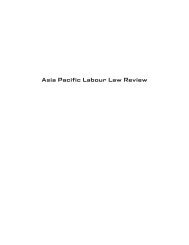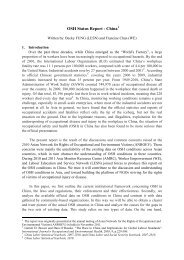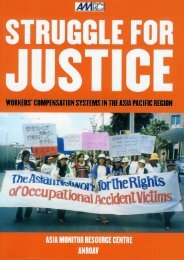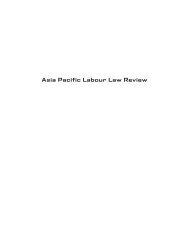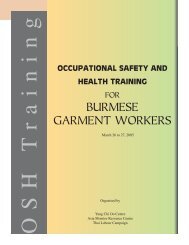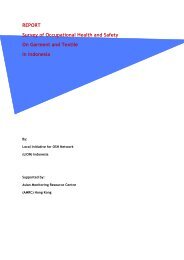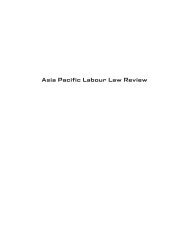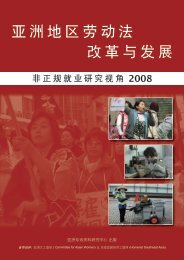Singapore - Asia Monitor Resource Center
Singapore - Asia Monitor Resource Center
Singapore - Asia Monitor Resource Center
Create successful ePaper yourself
Turn your PDF publications into a flip-book with our unique Google optimized e-Paper software.
SINGAPOREtion. The Act also regulates the use of union funds. Thelatest definition and amendments to the Trade Union Actappear to stress the NTUC’s role, which has evolvedfrom solely acting as a bargaining agent on behalf ofworkers to a social partner in nation-building.Under the Act, trade unions can be deregistered for anumber of reasons, among them misuse of funds, a beliefthat the trade union may be used against the interestsof workers (who determines this is unclear), or thatworkers can be better represented by another trade union(who determines this is unclear).Union formation andmembership coverageForming and joining a trade union is legally sanctionedin <strong>Singapore</strong>, and takes only seven members to applyand register a new union. Union density stands at about14.8 percent. The number of overall employee trade unionshas fallen during the last decade (from 83 to 71), butmembership numbers have increased significantly (an increaseof around 121,000 members to a total of 338,311,or an increase of 35.8 percent), bucking the general <strong>Asia</strong>nand global trend. Sixty-five of all trade unions (91.5 percent)belong to the NTUC. Trade unions with more than10,000 members have more than doubled over the decadefrom 1991, at the expense of smaller unions, most ofwhich have declined significantly.Roles and function of unionsTrade unions in <strong>Singapore</strong> are one of three legs of a tripartitesystem of industrial relations. As outlined in theTrade Unions Act, the trade union movement’s majorrole is to promote good industrial relations, improveworking conditions, and raise productivity.These functions are very different to the narrowly definedand traditional objectives in the 1970s. The tradeunion movement now sees its role as working in partnershipwith employers and government. It is also heavilyinvolved in social, educational, and recreational activities.The NTUC provides job search assistance, training,skills development, programmes to increase productivityand workplace health (or what they call ‘’), ownershipand management of FairPrice (one of <strong>Singapore</strong>’sleading supermarket chains with over 100 stores islandwide). In their social role, unions now own and managechildcare centres, clubs, and holiday bungalows.Collective agreementsCollective bargaining takes place at the enterprise level.Trade unions can represent workers, but they are barredfrom negotiating such issues as ‘promotion, transfer, newhiring, assignment of duties of employees, dismissal, retrenchment,and reinstatement’. 19 Most agreements arefor two years. Although most are arrived at through negotiationand conciliation, irreconcilable disputes are resolvedby the IAC, which determines awards on thoseissues where the parties cannot reach agreement.2001 saw a total of 407 collective agreements, ofwhich 398 were in the private sector and the remainingnine from statutory boards. No government workers arecurrently covered by collective agreements.Because collective agreements are negotiated on thebasis of individual enterprises, the 407 agreements extantin 2001 account for only a small proportion of workers.For instance, although there were 398 agreements inforce in the private sector in 2001, they accounted foronly 4.53 percent of all private enterprises and coveredthe interests of 44,465 employees who were union members.All 407 agreements covered 54,830 workers. 20Employer organisationsIt is worth noting briefly the important role played byemployer organisations in <strong>Singapore</strong>. Under the tripartitesystem, such organisations play a crucial role in determiningthe industrial relations landscape. The currentpeak body representing employers – the <strong>Singapore</strong> NationalEmployers Federation (SNEF) has around 1,800members and is registered as a trade union under theTrades Unions Act. It is, in effect, the national trade unionof employers and is thus ‘the counterpart to theNTUC’. SNEF sits with the NTUC on a variety of tripartedbodies such as the National Wages Council andthe National Productivity Board. Just like the NTUC,SNEF is entitled to select panel members for the IAC.Other bodies also represent business in differentways, such as the <strong>Singapore</strong> International Chamber ofCommerce (SICC), and the <strong>Singapore</strong> Confederation ofIndustries (SCI). In 2001, membership of employers’trade unions stood at 1,971.Strikes and lockoutsIndustrial action is regulated through the Trade DisputesAct, the purpose of which is to control trade disputes,<strong>Asia</strong> Pacific Labour Law Review 7



